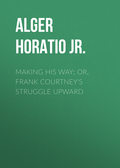
Alger Horatio Jr.
The Young Bank Messenger
CHAPTER XXXV.
MR. BOLTON AND HIS CLIENT
Benjamin Bolton sat at his desk in the law office of Albert Norcross, on Nassau Street. He was well, even handsomely dressed, and looked very unlike the shabby tramp who had called months before at the house of Stephen Ray.
He was really a man of ability, and this his employer had found out. He had raised Bolton's salary to a liberal figure, and felt that in securing his services he had made a real acquisition.
Bolton was absorbed in preparation for a case which had been assigned to him, when a boy came to his desk with a card.
Bolton no sooner read the name, "Ernest Ray," than he became eager and excited.
"Tell him to come in," he said.
Ernest, quiet and self-possessed, entered the office and approached the lawyer's desk.
"Are you Mr. Bolton?" he asked
"Yes, and you–"
"I am Ernest Ray."
Benjamin Bolton looked keenly at the boy, admiring his handsome face and manly bearing.
"I see your father's looks in you," he said.
"Then you knew my father?" said Ernest, eagerly.
"Yes. We were young men together."
"I am glad to meet you then."
"You come from California?"
"Yes."
"I judge from your appearance that you have not suffered from poverty."
"I have been fortunate at Oreville. At Oak Forks I lived very humbly with Peter Brant, an old servant of my father."
"Yes, I remember Peter. Is he alive still?"
"No, he died a little less than a year since. Till his death I thought him my uncle, and knew no other relatives. Before he died he told me who I was."
"How did he live?"
"On a small sum left by my father. When he died it was all exhausted except a hundred dollars. I took that and went to California with a man named Luke Robbins, who has proved my faithful friend."
"What were you doing in California? Were you working at the mines?"
"No. I was keeping a store where I sold miners supplies."
"Did it pay you well?"
"I was very well paid for a boy. When I left Oreville I was worth a thousand dollars."
"That is well, but it is only a drop in the bucket compared with the fortune you are entitled to."
"Now held by Mr. Stephen Ray?"
"Yes; he will be surprised to see you here in the East."
"He has seen me," said Ernest, quickly.
"What!" exclaimed the lawyer. "You have not called upon him?"
"No. I met him on the train and afterwards at a Buffalo hotel. My cousin Clarence was with him."
"Did you have any conference with them?"
"I talked with Clarence, not with his father."
"Did you think the father knew you?"
"Yes, but he did not speak to me."
"He told me when I called upon him some time ago that you were dead–that you had died in Georgia."
"What could have been his object?"
"He did not wish me to find you, for I had the proof that the estate was rightfully yours."
"What led you to think I was alive?"
"I cross-examined Clarence, who did not know his father's desire to keep us apart."
"Is the estate a large one?"
"Quarter of a million, at least."
Ernest's eyes opened wide with amazement.
"But I will introduce you to Mr. Norcross, my principal, and we will talk over our plan of operations. You must assert your rights, and demand that your grandfather's will be carried out. Are you content to place yourself in our hands?"
"Entirely so. But I am sorry for Cousin Stephen. It will be a great blow to him."
"Don't waste any pity upon him. He defrauded your father, and meant to defraud you."
CHAPTER XXXVI.
AN IMPORTANT INTERVIEW
"A gentleman to see you, sir." This was the message brought to Stephen Ray by the servant one morning.
"Did he give his name?"
"No, sir."
"Very well; bring him up."
Mr. Ray was sitting at the desk in his library. He was looking over some plans for the improvement of his already handsome residence.
He proposed to enlarge a lower room by a bay-window, and to carry the piazza round on each side. It would cost something, but his income was ample–at least four times his expenditure.
He looked up as a handsomely dressed gentleman entered the room.
"What is your business, sir?" asked Stephen Ray, formally.
The visitor smiled.
"You don't recognize me, Stephen Ray?" he said.
"Benjamin Bolton!" exclaimed the other, his countenance changing.
"The same."
"I judge from your appearance that your circumstances have improved," said Mr. Ray, coldly.
"Fortunately, yes."
"You have probably come to receive my congratulations. Well, I congratulate you."
"Thank you. The money you kindly loaned me when I was last here did me a great deal of good."
"I presume you have come to repay it," said Ray, with a sneer.
"You are right," and Bolton drew from his pocket two fifty-dollar bills, which he tendered to his host.
Stephen Ray was fond of money, and he received the notes with satisfaction.
"You have acted honorably," he said more graciously. "Are you located in the neighborhood, Mr. Bolton?"
"No, in New York City. I am in a law office there."
"I am pleased with your success. I would ask you to remain, but I am busy this morning."
"Excuse me, Mr. Ray, but the repayment of the loan was not my only errand. I am here on more important business."
Stephen Ray's countenance changed. He began to fear that Bolton had found Ernest.
"Well?" he said stiffly.
"When I was here last year you told me that Dudley Ray's son Ernest was dead."
"Yes, he died in Alabama."
"When I was here before you told me he died in Georgia."
"I believe it was in Georgia," said Stephen Ray, disconcerted.
"You will be glad to hear that it is a mistake–about his death, I mean. He is as much alive as you are."
"Mr. Bolton," said Ray angrily, "you are trying to impose upon me. The boy is dead, I tell you."
"And I tell you he is not dead. I saw him only yesterday."
"You may have seen some one who pretended to be Ernest Ray."
"I should not be easily deceived. He is the image of his father."
"I don't believe the boy is alive."
"Shall I bring him here?"
"You need not trouble yourself. I can have nothing to say to him, whether he is really Ernest Ray or an impostor."
"I beg your pardon. If he is Ernest Ray, under the will which I have in my possession he is the owner of this property."
Bolton spoke firmly, and looked Ray resolutely in the eye.
Stephen Ray flushed and then paled. There was a great fear in his heart, but he resolved to brave it out.
"This is a base conspiracy," he ejaculated. "Your share in it ought to land you in State's prison."
"I am willing to take my chance of it," said the lawyer calmly. "Didn't you recognize the boy when you saw him?"
"What do you mean?"
"You saw him in the hotel at Buffalo. He recognized you, and had a conversation with your son."
"Had a conversation with Clarence? That is a lie. Clarence never spoke to me about it."
"You had better question him. But there is no need of sparring. I tell you confidently that Ernest Ray is alive, and demands the estate which you hold, under his grandfather's will."
"This is simply ridiculous. Of course there is but one answer to such a proposal."
"And what is that?"
"I refuse absolutely to make any concession to an impostor."
"That is your final answer?"
"It is."
"Then I give you notice that the boy will at once bring suit for the restoration of the estate and the vindication of his rights."
"I suppose you are his lawyer," sneered Ray.
"The firm with which I am connected has undertaken the case."
"What is the firm?" asked Stephen Ray, with an anxiety which he could not conceal.
"Norcross & Co.," answered Bolton.
Great drops of perspiration appeared on the brow of Stephen Ray. He knew very well the high reputation and uniform success of the firm in question.
He did not immediately answer, but began to pace the room in agitation. Finally he spoke.
"I don't know what to say. This has come upon me as a surprise. I thought the boy dead. I may be willing to make some arrangement. Bring him here some day next week say Tuesday and we will talk the matter over."
"You must do something more than talk the matter over, Stephen Ray. A great injustice has been done, and the wrong must be righted."
"Come here next Tuesday," was the only answer made.
The lawyer bowed and withdrew.
CHAPTER XXXVII.
CONCLUSION
On Tuesday Bolton returned with Ernest. Two hours were spent in conference with Stephen Ray. The latter fought hard, but had to yield in the end. He understood perfectly well the strength of his opponent's case.
Ernest consented to receive the estate as it was bequeathed to his father, without any demand for back revenues. Whatever Stephen Ray had accumulated besides, he was allowed to retain.
As this amounted to a hundred thousand dollars, Ray felt that it might have been worse. Had he not been dissuaded by Bolton, Ernest would have consented to share the estate with the usurper, but the lawyer represented that this would be condoning the wrong done to his father.
In a month the whole matter was settled, and Stephen Ray departed, removing to Chicago, in which city he had some business interests.
"But what shall I do with this large house?" asked Ernest. "I don't want to live here."
"I know of a gentleman who would like to hire it for term of years," responded Bolton. "He will pay a rental of five thousand dollars a year. The bonds which you inherit will yield an income equally large."
"So that my income will be ten thousand dollars a year?" said Ernest, dazzled.
"Yes."
"What shall I do with it all?"
Bolton smiled.
"You are but seventeen," he said. "A few years hence you will probably marry. Then you can occupy the house yourself. Meanwhile–"
"I will go back to California. Luke will expect me. While I am away I appoint you my man of business. I wish you to have charge of my property at a proper commission."
"I will undertake the charge with pleasure."
Bolton knew how much this would increase his importance in the eyes of the firm by which he was employed. Still, Ernest could not have made a better choice. Bolton was no longer intemperate. He was shrewd and keen, and loyal to his young employer.
Ernest returned to California, but he had lost his old zest for business, now that his fortune was secure. He soon came East again, and entered upon a plan of systematic study, ending with a collegiate course. He brought with him Frank Fox, the son of the dead outlaw, who regarded him with devoted affection. They lived together, and he placed Frank at a well-known school, justly noted for the success of its pupils.
Of the many boys with whom Frank was associated not one suspected that the attractive lad, who was a favorite with all, was a son of the noted desperado whose deeds had been commemorated in dime novels and were a matter of common knowledge in the West. Ernest had cautioned the boy to say as little as possible of his past history.
Years have gone by, and what Bolton predicted has come to pass. Ernest is a young man, a college graduate, and he will soon be married to a young lady of high position in the city of New York. He will go abroad for a year, and on his return will take up his home on his ancestral estate.
Last week he received a letter from a patient in a New York City hospital. It was signed John Franklin, a name with which he was not familiar.
In some wonder he answered the call, and was led to a bed on which lay a gaunt, spectral man, evidently in the last stage of existence.
"Is this John Franklin?" asked Ernest, doubtfully.
"That is the name I go by now," answered the dying man.
"Do I know you? Have I ever met you?"
"Yes."
"I don't remember you."
"If I tell you my real name, will you keep it secret?"
"Yes."
"Then I am John Fox."
"What! the noted outlaw?"
"I am all that is left of him. You will not betray me?"
"No; certainly not. Can I do anything for you?"
"Yes; you were left the guardian of my brother's child?"
"Yes."
"Is he alive? Is he well?"
"Yes."
"Will you bring him here? Will you let me see him before I die?"
"I will. I cannot refuse the request of a dying man."
So Ernest brought Frank to the bedside of his dying uncle. It was a sad interview. Frank was moved, but John Fox, seeing him strong, handsome, robust, felt comforted.
"He at least has profited by the fate that overtook his father and myself. I shall die content, for I leave him in good hands. Don't let him think too hardly of us!"
"I will not. And so far as I can compass it, his future life shall be happy."
The dying outlaw reached out his hand and pressed Ernest's gratefully. A day later, and he was dead.







